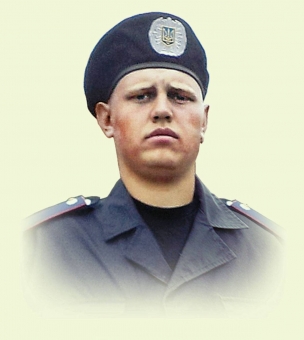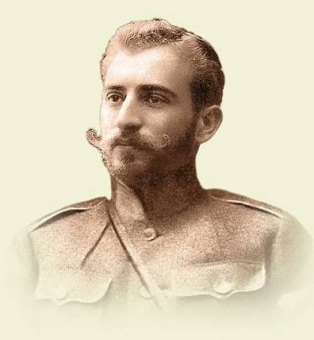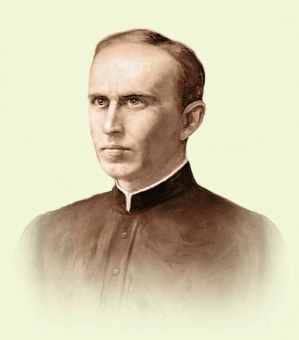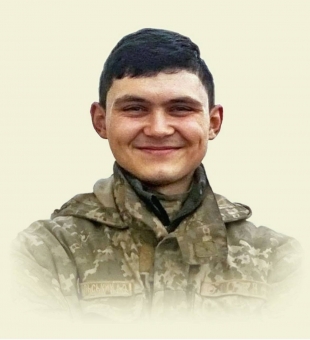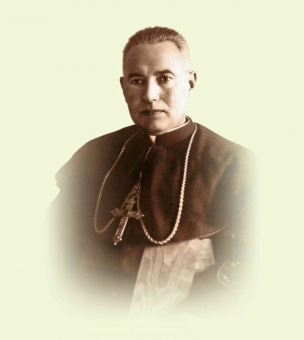
Іван Лятишевський (17 жовтня 1879, Богородчани — 27 листопада 1957, Станіславів) — український церковний діяч, педагог, дійсний член Українського богословського наукового товариства (УБНТ), єпископ-помічник Станіславівської єпархії УГКЦ, в'язень радянських таборів, ісповідник віри.
Народився у Богородчанах в сім'ї Юліяна та Анни з роду Галавай.
Закінчивши цісарсько-королівську гімназію в Станіславові, поступив на навчання на богословський факультет Львівського університету, звідки після другого року богослов'я перевівся на факультет богослов'я Віденського університету. 24 листопада 1905 року у Відні отримав ступінь доктора богослов'я на основі праці про Флорентійську унію: «Die Union zu Florenz und ihre Bedeutung für die Entwicklung der kirchlichen Verhältnisse bei den Ruthenen». Продовжив студії в Інсбруку та Відні (біблістика). 20 жовтня 1907 року рукоположений Владикою Григорієм Хомишиним на священика.
Декілька років був зайнятий душпастирською працею, а в 1911 році став професором церковної історії в Духовній семінарії і ліцеї ім. св. Івана Золотоустого в Станіславові, а згодом отримав посаду катехита при реальній школі і польських гімназіях (теж у Станіславові). Крім того, довгий час був радником, а пізніше — заступником голови Церковного Суду в справах подруж. Займався науковою працею: в богословських часописах неодноразово друкувалися його статті на різні теми.
Після кількох років праці в єпархії, виїхав на студії до Мюнхену, потім до Фрібуру (Швейцарія). В 1911—1912 роках готував габілітаційну працю на катедру церковної історії у Львівському університеті. Працював над монографією про Константинопольського патріарха Івана XI Веккоса († 1297). У Фрайбурзі вивчав допоміжні історичні дисципліни, але габілітації не довершив, бо був відкликаний до Станіславова. В 1913 pоці в Станіславові, видав працю «Іпатій Потій і єго значіння для унії».
В часі визвольних змагань українського народу був керівником відділу для церковно-релігійних справ при уряді Західно-Української Народної Республіки в Станіславові. У Земельному Банку у Львові був довгі роки головою Надзірної Ради.
В 1923 р. став дійсним членом-засновником історично-правничої Секції Наукового Богословського Товариства у Львові. В «Богословії» (1926) надрукував статтю «Митрополит Андрій Шептицький як Епископ Станиславівський (від 24 вересня 1899 — 13 січня 1901)», а опісля працював над підготовкою до друку неопублікованого полемічного твору Йова Язьби з XIII століття, пов'язаного з Ліонською унією 1274 року. Також дописував до журналу «Добрий Пастир».
4 липня 1927 року владика Григорій Хомишин надав о. Лятишевському достоїнство крилошанина.
24 листопада 1929 року іменований титулярним єпископом Адади і єпископом-помічником Станіславівським. Хіротонія відбулася в катедральному соборі Станіславова 26 січня 1930 року. Головним святителем був митрополит Андрей Шептицький, а співсвятителями — Станіславівський єпископ Григорій Хомишин та Перемишльський — Йосафат Коциловський. Першу архієрейську Святу Літургію Преосвященний Іван Лятишевський відправив у своєму родинному містечку Богородчани. 19 січня 1930 року іменований архіпресвітером і генеральним вікарієм. Допомагав єпископові Хомишину в адміністративній праці єпархії, у канонічних візитаціях та інших єпископських обов'язках, очолив започатковану в 1930-х роках у Галичині Католицьку Акцію.
Під час першої більшовицької окупації Західної України (1939—1941), НКВД-исти неодноразово викликали єпископа Лятишевського на довгі нічні допити. Під час другої окупації, 11 квітня 1945 року єпископ Лятишевський був ув'язнений разом з іншими греко-католицькими владиками. Звинувачений в антирадянській діяльності. Після півторарічних допитів і побоїв у Лук'янівській тюрмі в Києві, де він мав нагоду зустрітися з єп. Хомишиним, засуджений на п'ять років примусової праці в Казахстані, до карного табору в Мерке (1946—1949), а потім в Чулактау. За кілька днів до звільнення отримав повторне звинувачення і ув'язнення на поселенні в Чулактау. З архівно-слідчої справи випливало, що: «Агентурним та офіційним шляхом встановлено, що Лятишевський відбуваючи заслання в Талаському районі Джамбульської області, має великі зв'язки і листується з духовенством греко-католицької орієнтації, з антирадянським елементом, який проживає на території України і за кордоном, від яких отримує матеріальну допомогу…» і його «за приналежність до контрреволюційної діяльності і пропаганду антирадянських католицьких ідей, вислати на поселення в Джамбульську область Казахської РСР під нагляд органів МДБ».
Після десяти років каторжного життя в 1955 році повернувся до Станіславова. Останні два з половиною роки він проживав у своїх родичів у Станіславові. Приватно служив Служби Божі.
Помер 27 листопада 1957 року в Станіславові і там похований.
